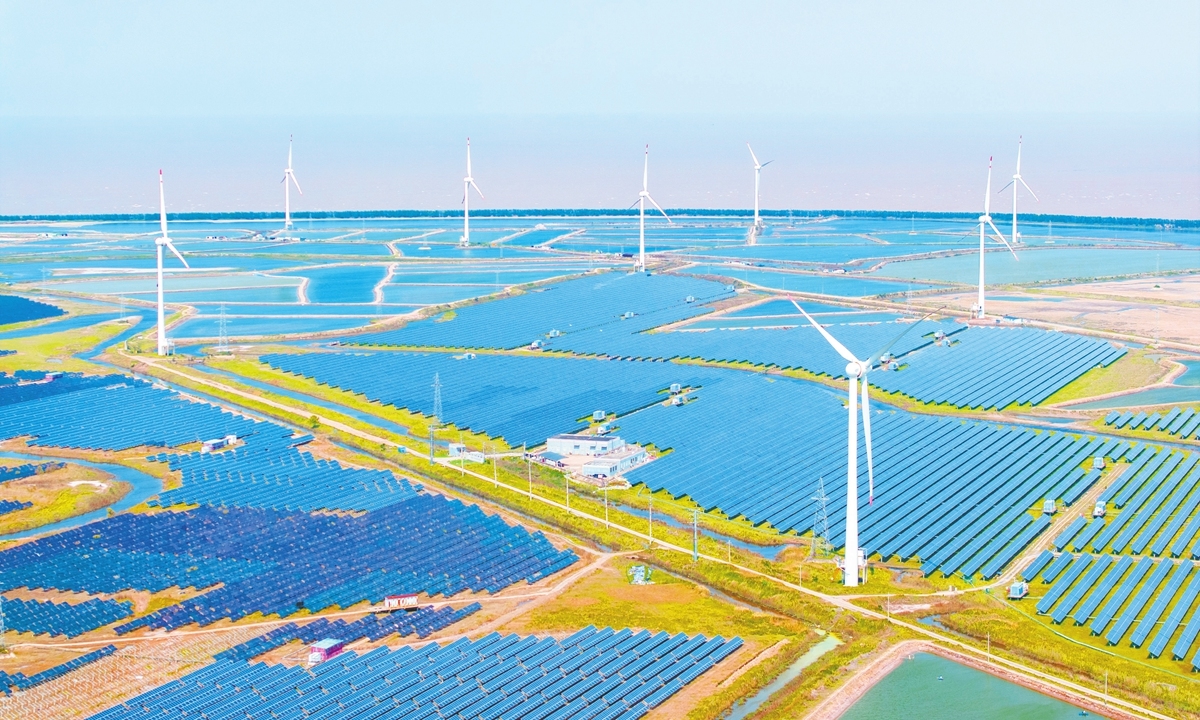
A view of a project that integrates wind
and solar power generation with fish farming in Yancheng, East China's Jiangsu Province, on May 28, 2025 Photo: VCG
A new report from energy think tank Ember finds that 10 BRICS countries accounted for more than half - 51 percent - of global solar electricity generation in 2024, up from just 15 percent a decade earlier.
These findings, ahead of the BRICS summit, underscored a major shift in the global energy transition, positioning the bloc as a central player, according to the report dated July 3, which used analysis to highlight how China, India,
and Brazil have emerged as the primary drivers of this shift.
In 2024, China remained the world's largest solar generator with 834 terawatt hours (TWh) of output — nearly three times more than the second-ranked US. India reached 133 TWh, a fourfold increase since 2019, while Brazil joined the global top five by surpassing Germany with 75 TWh of solar generation, per the report.
The rise was not just in total generation but also in the share of new electricity demand met by clean power, the report said. In 2024, solar alone met 36 percent of the increase in electricity generation across all BRICS countries, a major jump from 14 percent in the previous decade
and just 0.25 percent a decade before that.
The report noted that China is leading the shift, with recent Ember data showing that during the first five months of 2025, China met all its additional electricity demand with clean power.
India
and Brazil also registered strong solar growth from January to April, with year-on-year increases of 32 percent
and 35 percent.
Lin Boqiang, director of the China Center for Energy Economics Research at Xiamen University, told the Global Times on Thursday that Chinese solar companies' technologies
and especially low-cost advantages have fueled the rapid growth of solar energy in many of the BRICS countries.
It should be noted that most of these countries did not implement protectionist policies for green products so there has been a perfect cooperation partnership going on, between the capacity advantage from China
and strong local demand for solar
and other green technologies, Lin said.
With solar
and other clean technologies becoming increasingly cost-competitive, the BRICS countries have a timely opportunity at this summit to deepen their commitment to clean energy — enhancing energy security
and reducing reliance on imported fossil fuels, the Ember report said.
The 17th BRICS Summit will be held in Rio de Janeiro, Brazil on July 6
and 7.
Member economies of BRICS, which cover major emerging market
and developing countries in the world, hold great potential for cooperation, China's Ministry of Commerce spokesperson He Yongqian told a routine press conference on Thursday in Beijing.
In recent years, thanks to the concerted efforts of all parties, mechanisms for BRICS economic
and trade cooperation have been continuously improved,
and the bond of their economic
and trade cooperation has been steadily strengthened, the spokesperson said.
Editor:Evan


